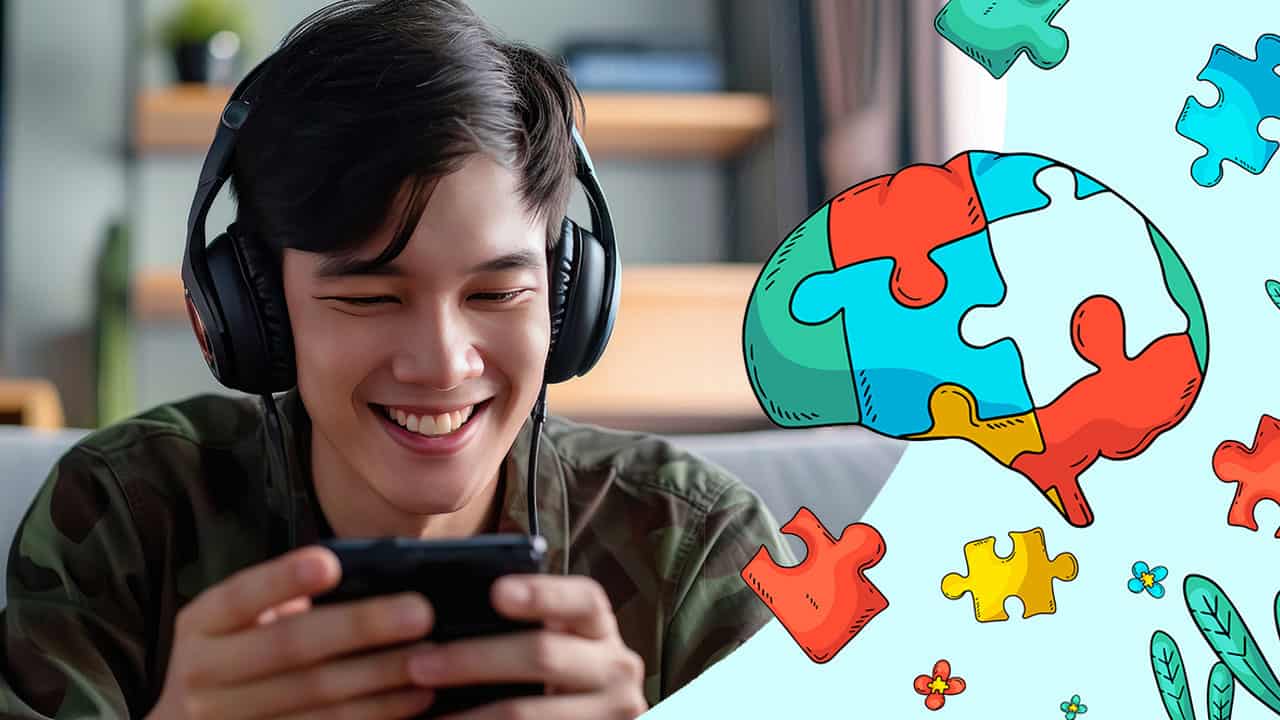
Autism and Gaming Addiction: What’s the Link?
Video games are one of the most popular activities for people on the autism spectrum. For many, they offer a safe and predictable environment away from the pressures of everyday life, but some autistic gamers struggle with video game addiction.
In this article, we look at the common signs and symptoms of autism, explore the benefits of video games for people who are autistic, and explain the link between autism and gaming addiction.
What is autism spectrum disorder?
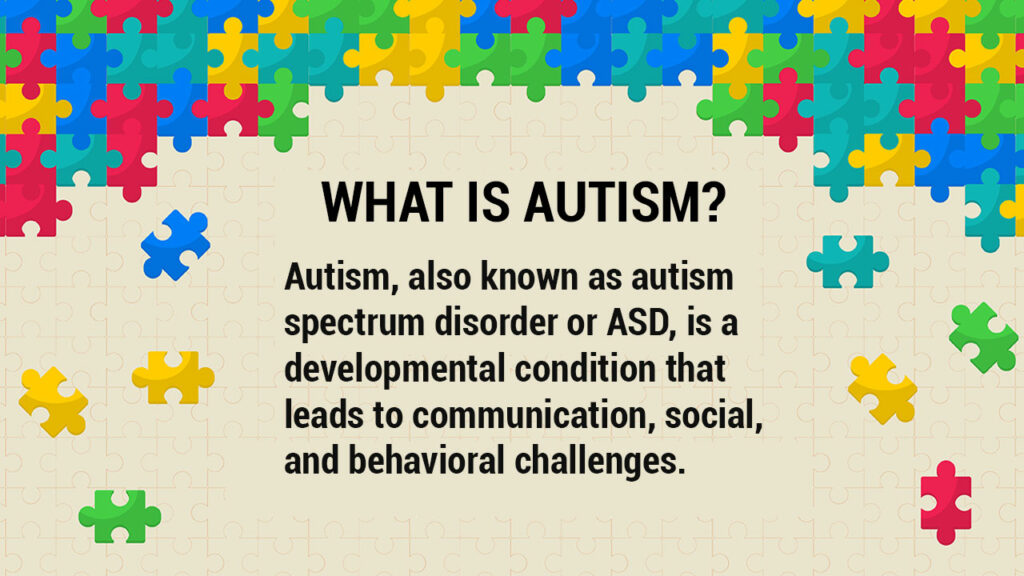
Autism spectrum disorder (ASD) is the medical name for autism. It’s a common neurological and developmental disorder that impacts how people communicate, behave, learn, and interact with others.
People with autism are sometimes described as being ‘on the spectrum’. The term ‘spectrum’ refers to the breadth of symptoms, which can range from mild to severe. For example, some autistic people have good conversation skills, whereas others are nonverbal, and some people with the disorder live independently, while others need constant support.
According to the Centers for Disease Control and Protection, 1 in 36 children and 1 in 45 adults in the U.S. are on the autism spectrum, and boys are almost four times more likely to be diagnosed with the disorder than girls. 1 1. https://www.cdc.gov/mmwr/volumes/72/ss/ss7202a1.htm?s_cid=ss7202a1_w ×
ASD is increasingly detected in early childhood as medical professionals and parents become more knowledgeable about the signs and symptoms of the disorder, but it’s sometimes not diagnosed until much later in life.
There doesn’t appear to be one specific cause of autism. Instead, there are a number of risk factors that may make someone more likely to develop it. These include certain genetic conditions, environmental factors, older parents, a sibling with autism, and very low birth weight.
Common signs and symptoms of autism
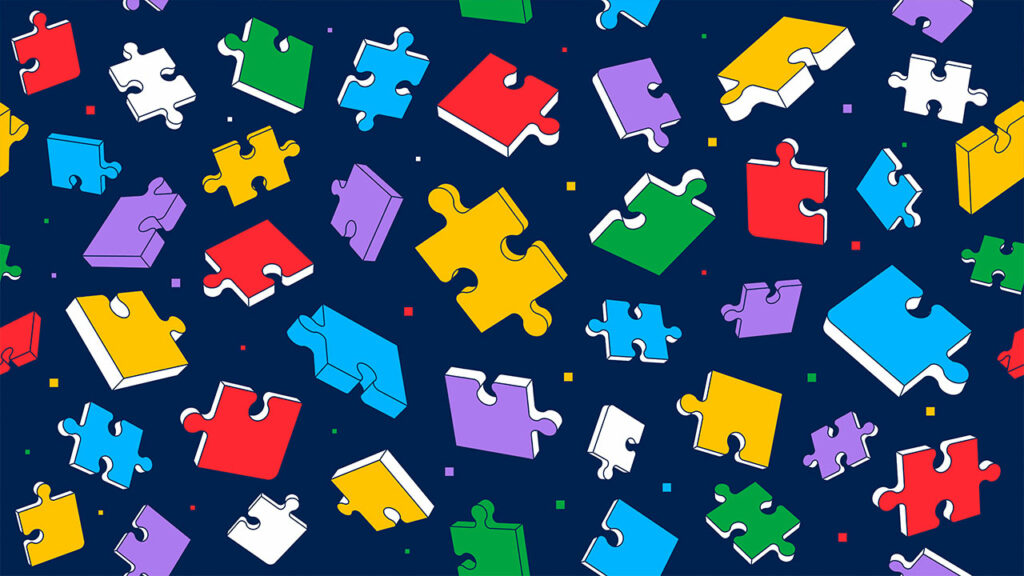
If you or a loved one are autistic, you’re likely to be familiar with the typical ASD signs and symptoms. If not, here are some of the behaviors associated with the disorder:
- Struggles to understand what others may be thinking or feeling
- Avoids making eye contact
- Difficulty reading facial expressions and understanding body language
- Finds it hard to articulate their needs or feelings
- Speaks in a stilted way
- Repeats the same phrases
- Takes things very literally; for example, if asked whether they ‘need a hand’ they wouldn’t understand as they already have two hands
- Struggles in social situations
- Lacks understanding of social etiquette, such as not talking over people
- Prefers to be on their own and has difficulty making friends
- Has problems expressing their emotions
- Can appear rude or blunt without meaning to
- Dislikes being touched or anyone invading their personal space
- Overly focused on certain subjects or activities to the exclusion of others
- Inflexible: uncomfortable with new experiences and changes to daily routine
- Withdraws from difficult or challenging situations
- Sensory hypersensitivity: dislikes certain tastes, smells, or sounds
- Repeats certain movements like hand flapping, spinning, jumping, rocking, etc – known as ‘stimming’
- Arranges items in a very specific way
- Gets upset if asked to do something they don’t want to do
Some people try to mask their autism by copying what others say and how they behave. Women and girls are particularly good at doing this, which is why it can be harder to spot autism in females.
Why do autistic people like video games so much?
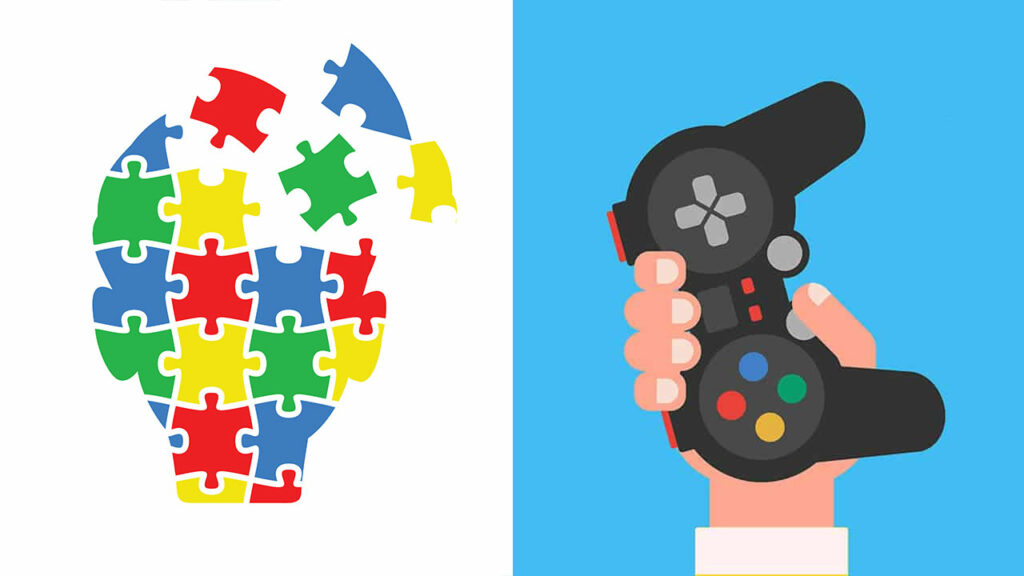
Do you have an autistic child obsessed with video games, or are you an avid gamer on the autism spectrum? If so, you’re not alone. Gaming is a popular hobby and career choice for autistic people because it can help relieve some of the symptoms outlined above.
So, what percent of gamers are autistic? According to research, 41.4% of autistic youths spend a significant amount of time gaming, compared with 18% of youths who don’t have the disorder 2 2. https://www.ncbi.nlm.nih.gov/pmc/articles/PMC3536490/#R30 × . Ukie also found there are four times more autistic people working in the UK gaming industry than in any other sector.
Given these statistics, you may be wondering, ‘Is gaming good for autism?’ and ‘Does gaming affect autism?’ Let’s look at the benefits of gaming for people who are autistic:
Escapism
Gaming can be a distraction from the challenges of life as an autistic person. Playing fantasy games allows them to forget about their everyday worries and gives them something positive to focus on in a safe space.
Stress relief
It’s estimated that around 40% of people with autism also struggle with anxiety or an anxiety disorder such as obsessive-compulsive disorder 3 3. https://adaa.org/learn-from-us/from-the-experts/blog-posts/consumer/anxiety-autism-spectrum-disorder × . Anxiety often makes ASD symptoms worse, but the immersive nature of video games can have a mood-boosting effect and provide stress relief.
Social interaction
Playing video games is a good way for autistic people to engage with others in an environment where face-to-face communication isn’t necessary. It’s easier to type a message or interact as a character rather than socialize in person because it eliminates the need to read body language and maintain eye contact. Autistic gamers tend to spend a lot of time on apps such as Discord.
Structure and routine
Most video games have a well-defined structure and clear rules, which resonates strongly with people on the autism spectrum. They thrive on repetition and routine, and gaming provides this in abundance. Plus, gaming is much more controllable and predictable than real-life, and this can be comforting for those with autism.
Opportunity for focus
Many autistic people find it difficult to focus on tasks and activities. They need constant stimulation to stay interested and engaged, which is what draws them to gaming. Video games provide regular stimulation to the brain as players need to quickly think, analyze, plan, and react.
Improved flexibility
One of the common traits of autism is inflexibility; people with autism are rigid in their routines. But playing video games can help them learn from mistakes and adapt to changing—and sometimes challenging—scenarios in a safe space. Over time, this may help to introduce more flexibility into their offline behavior.
Building problem-solving skills
Some autistic children play games for entertainment without realizing they’re learning valuable life skills. So, what kind of video games do autistic people play that help teach problem-solving? Some of the most popular video games for autistic adults and children, like Roblox and Minecraft, involve strategic thinking in a fun and low-pressure environment, which may improve decision-making and help them cope with the complexities of everyday life.
Special interest
As mentioned in the symptoms list, autistic people can become fixated on a certain subject or activity. Many people with ASD choose gaming as their ‘special interest’. Playing a particular title or type of video game becomes like self-medication; they’re often happier, calmer, and more focused when immersed in their virtual world.
Why are people with autism more at risk of video game addiction?
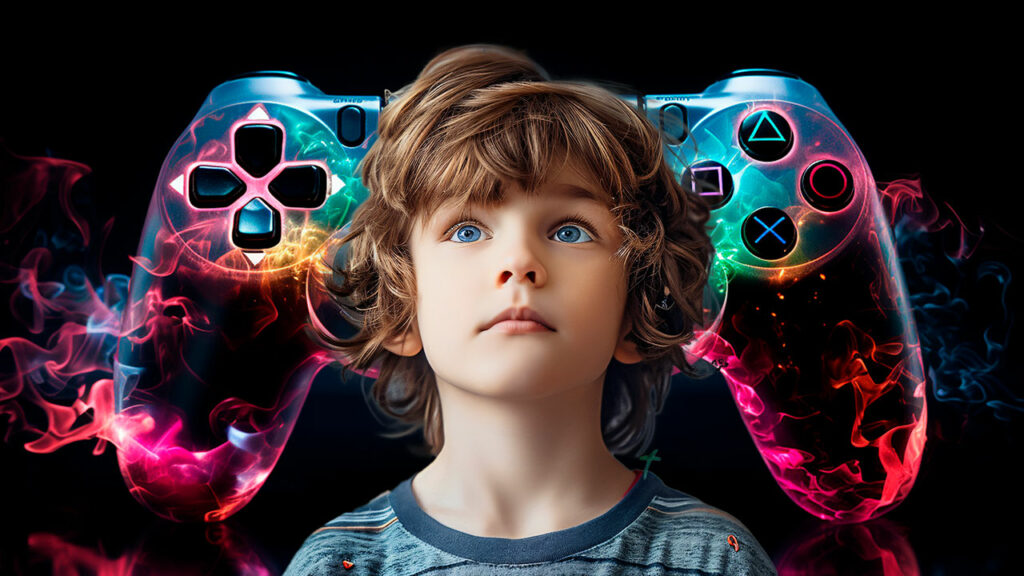
Video games can offer multiple benefits to those with ASD when played in moderation. However, autistic people are more at risk of developing gaming addiction. According to a 2021 study that investigated the link between ASD and gaming disorder, 9.1% of those with video game addiction were autistic, compared with 2.9% of people who were neurotypical 4 4. https://www.ncbi.nlm.nih.gov/pmc/articles/PMC9114087/ × . ADHD is also a known risk factor for internet addiction.
So, why are autism and video games a potentially dangerous mix? Some of the benefits of gaming that are outlined above can have a negative impact on autistic people if their gaming starts to spiral out of control:
- Social isolation – Hours spent interacting with other gamers online may lead to withdrawal from in-person relationships, and autistic people already have issues with social skills and connections
- Lack of physical activity – Becoming fixated on gaming as a ‘special interest’ can be to the exclusion of all other activities, including sport and exercise
- Poor time management – Although people with autism like the structure and routine within video games, hours spent gaming can negatively impact time spent on important everyday tasks
- Sleep problems – The constant stimulation provided by gaming can make it difficult to step away from the screen and unwind, which can cause sleep deprivation and exhaustion
- Anxiety – Playing video games to escape from anxiety and other problems may offer temporary relief, but long-term use can make these issues worse
In fact, using gaming to escape or relieve a negative mood is one of the nine criteria for gaming addiction, as outlined in the Diagnostic and Statistical Manual of Mental Disorders, 5th edition. Other criteria include giving up other activities previously enjoyed, continuing to game despite the problems it causes, and needing to game more and more to reach the same ‘high’. This is because playing video games stimulates the brain’s reward system, and the rush of dopamine it produces can develop into an addiction as gamers constantly crave the feeling of pleasure.
How to protect an autistic gamer

Create predictable schedules
Autistic kids thrive on routine and structure. Establish consistent daily schedules with designated gaming time, meals, physical activity, and offline activities. This helps them meet their need for structure without relying solely on video games.
Use visual supports such as timers, schedules, or apps that show exactly when gaming time starts and ends.
Give advance warnings (e.g., “10 minutes left”) rather than abrupt transitions, which are particularly difficult for autistic individuals. Understand that when they are playing multiplayer games with friends, games may not finish in “10 minutes” so you will need to stand nearby in order to help them transition more easily when the game finishes.
This provides structure while respecting their need for predictability and reduces meltdowns around gaming boundaries.
Alternative coping strategies
Gaming is often one of their primary ways to manage anxiety and stress.
They need to learn other healthy coping mechanisms. Work with your child to identify 1-2 other activities that they can use to relax without gaming such as spending time in nature, mindfulness exercises, physical movement, creative outlets, or sensory activities.
The goal isn’t to eliminate gaming entirely, but to teach them multiple tools to regulate their emotions and nervous system.
Find new social communities
Help them find new communities around shared interests such as board game clubs and STEM activities.
These provide face-to-face practice in lower-pressure environments. The structured schedule of these activities also helps to reduce anxiety.
Discord and online friendships are fine, but they need real-life social skills too.
With the right support, autistic kids can enjoy gaming without it controlling their lives…
Don’t only focus on gaming
Focus on non-negotiable daily health habits rather than arbitrary time limits.
Instead of fighting over “2 hours max,” establish that gaming happens after certain health requirements are met such as adequate sleep (specific bedtime), at least one meal eaten, and 15-30 minutes of physical movement/outdoor time.
This shifts the dynamic from you controlling their gaming to them choosing when to meet their health needs to access what they enjoy.
Need help for an autistic gamer?

Do you think you or your child may be addicted to gaming? Take our short video game addiction test for gamers and parents.
If, after taking the test, you meet criteria for problematic use, there are a wealth of resources on our website to support you, including articles, podcasts, videos, and forums.
We also have specialist coaching programs for gamers and families to help you or your child quit gaming completely or enjoy a healthier game-life balance.
Whether you’re a gamer with autism, parenting a gamer with autism, or have any other questions, book a Gameplan call to find out how we can help you.
